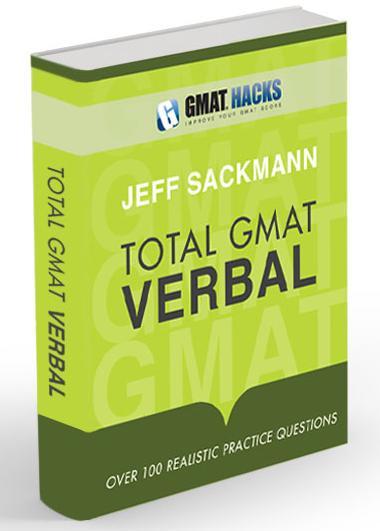
Bookshelf
|
|
Total GMAT Math Jeff's complete Quant guide, on sale now! |
|
|
Total GMAT Verbal Everything you need to ace GMAT Verbal! |
1,800 Practice Math Questions
Buy Jeff's books at Amazon.com

GMAT Official Guide, with IR
OG Math | OG Verbal
OG12 & Quant Rev solutions!
GMAT Question of the Day
Beginner's Guide to the GMAT
GMAT Hacks Affiliate Program

Recent Hacks

Categories
- General Study Tips
- Goals and Planning
- CAT Strategy
- The Mental Game
- GMAT Math Strategy
- GMAT Math Topics
- Mental Math
- Data Sufficiency
- Critical Reasoning
- Reading Comprehension
- Sentence Correction
- Analytical Writing Assessment
- Integrated Reasoning
- IR Explained
- Business School Admissions
- GMAT Prep Resources
- Practice Questions
- Total GMAT Math
- Total GMAT Verbal
- GMAT 111

Handle GMAT Reading Comprehension Passages Faster
| You should follow me on Twitter. While you're at it, take a moment to subscribe to GMAT Hacks via RSS or Email. |
When timing your progress through GMAT Reading Comprehension passages, it's important that you consider separately the time it takes to read the passage and the time you spend answering the questions. (You are timing yourself, aren't you?)
Usually, when people take too long on Reading Comprehension, it's because they spend too much time reading the passage. Or, as is sometimes the case, blankly staring at the passage thinking they are reading it, but really losing focus. The key to moving more quickly through passages is to eliminate, or at least minimize, the time you spent unfocused.
Time Management
You should spend 3-4 minutes reading each Reading Comprehension passage. That's a very general rule to apply to a wide range of test-takers and passage lengths, but it has served my students and me well. Unless you have a hard time reading english, you should have no problem getting through even the most difficult passages in four minutes.
Familiarity, as in all parts of the test, is key. If you know your way around common passage structures and each type of RC question, you will spend less time figuring out what you're dealing with, and more time dealing with it. My Total GMAT Verbal aims to give you a complete introduction to each aspect of this part of the test.
In fact, if you eliminate time spent blanking out, glazing over, and re-reading, you can probably read the longest, most difficult passages in three minutes. Fortunately, the standard isn't that high.
Staying Focused
Every GMAT prep company has some particular approach to Reading Comprehension passages, and some of them are very involved. There's no need to follow a strict formula, or to write down exact characteristics of every passage. (For instance, Kaplan suggests you jot down topic, scope, and purpose.)
What is important is that you write something down. It doesn't matter whether you outline the structure of the passage, rephrase each paragraph's topic sentence, or scribble down some key details that you think will come up in the questions. Whatever it is that comes easily to you, do it.
In my experience, I rarely refer back to my notes. That doesn't, however, mean that taking those notes was a waste of time. The purpose of the note-taking isn't to create a replacement for the passage, it's to keep you focused. If you force yourself to write something down at least once per paragraph, it's much more difficult to glaze over and spend a minute or more staring at the screen, accomplishing nothing.
How To Practice
As with every aspect of GMAT preparation, make your practice as test-like as possible. If you're working out of The Official Guide, prop it up against your desk or a wall, so that it simulates working off a computer screen. Don't even think about underlining the passage.
Tinker with my suggestions above: for one passage, try writing something down at the beginning of each paragraph; for another, at the end; for another, write things down whenever they seem important. There's no one write way to take notes to GMAT Reading Comprehension passages, and there's no way I'll be able to tell you which one is most practical for you.
You'll know that you're improving when two things happen:
- You're reading faster--no more than four minutes per passage.
- You spend less time re-reading the passage when confronted with questions.
I'm sure you know how important it is to manage your time wisely on the GMAT Verbal section. If you can control the amount of time you spend working through Reading Comprehension passages, you'll be in a much better position to do that.
About the author: Jeff Sackmann has written many GMAT preparation books, including the popular Total GMAT Math, Total GMAT Verbal, and GMAT 111. He has also created explanations for problems in The Official Guide, as well as 1,800 practice GMAT math questions.
 |
Total GMAT Verbal
The comprehensive guide to the GMAT Verbal section. Recognize, dissect, and master every question type
you'll face on the test. Everything you need, all in one place, including 100+ realistic practice questions. |